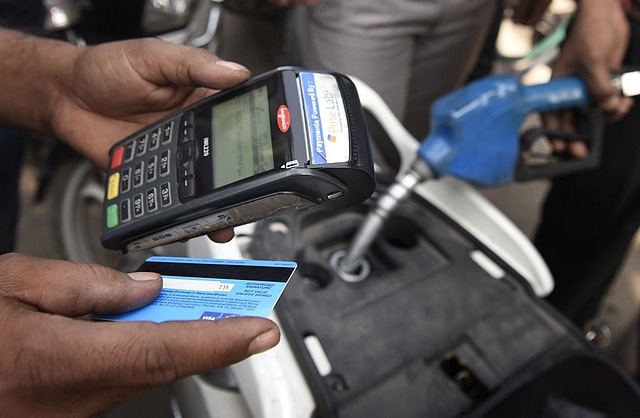
Rising Fuel Prices: Four Ways To An Excise Duty Cut Without Rocking The Fiscal Boat Much
Bringing fuel under GST is the most lasting solution but in an election year if the Modi government doesn’t want to rock the boat too much, then the only way forward is sharp reduction in the existing fuel taxes.
The Narendra Modi government’s obdurate refusal to lower excise duty on petrol and diesel on the ground that it would ground some of the welfare programmes besides aggravating fiscal deficit, is specious besides turning Robinhood taxation on its head.
Robinhood taxation is all about taxing the rich and spending the collections for the welfare of the poor. But that is best done through imposition of stiff direct taxes on the rich. What the Modi government is doing is burdening the poor given the fact that heavy petroleum taxation impacts the poor most and spending the collections on the poor.
The central government had raised excise duty on petrol by Rs 11.77 a litre and that on diesel by Rs 13.47 a litre in nine installments between November 2014 and January 2016 to shore up finances as global oil prices fell, but then cut the tax just once in October last year by Rs 2 a litre. The excise duty on these two sensitive products used by common man stands at Rs 19.48 per litre on petrol and Rs 15.33 per litre on diesel. This is whopping to say the least and a crushing burden.
That a Re 1 reduction in excise would result in a loss of Rs 30,000 crore to the exchequer proffered as the justification for this fiscal obduracy does not cut much ice with the cognoscenti when the government has the following alternatives among others to shore up its finances:
- Raising goods and services tax (GST) on jewellery from a soft 3 per cent to 28 per cent. Like fuel, demand for ornamental gold in our country is also inelastic to a large extent. Resultantly, tax collections on this count are bound to increase though there could be considerable resentment among the families celebrating the wedding of their daughters;
- Long term capital gains (LTCG) tax of 10 per cent on shares earned through bourses was a step in the right direction by the budget 2018. It should set the cash registers of the exchequer ringing merrily sooner than later. If it proves to be slightly inadequate, the tax can be hiked to 15 per cent without stepping on anybody’s toes;
- Reversing the decision to do away with wealth tax lock, stock and barrel. Instead of levying wealth tax on all items of wealth without any exception or fear or favour, the government in 2015 mindlessly abolished it once again on the specious ground that the expenditure on its administration was outstripping the collections therefrom. There is no reason why there should not be a 1 per cent wealth tax on net wealth in excess of say Rs 2 crore. All assets including bank balances and jewellery should be brought into the wealth tax net. The paltry collections earlier (about Rs 1,500 crore per annum) before it was scrapped was due to the invidious distinction between productive and non-productive assets that left out all save six types of assets; and
- Estate duty which has been kept in a suspended animation must be revived. A 10 per cent duty on estate in excess of say Rs 5 crore is not going to be resented as unreasonable when many states in the US impound as much as 50 per cent by way of death or inheritance tax. Another avowedly capitalistic nation, the Netherlands also imposes a stiff estate duty. Estate duty is a tax on inheritors.
The short point is we miss all opportunities in raising taxes especially on the direct taxes front and bemoan fiscal deficit. Direct taxes are the correctives any progressive and progressing country swears by because indirect taxes are innately regressive and hit the poor the most. It is easy for the central government to sit tight on its war chest while exhorting states to reduce value added tax on petroleum products. It should lead from the front and reduce excise duty on fuel substantially even while simultaneously acting on the above compensatory measures.
Bringing fuel under GST is, of course, the most lasting solution but in an election year if the Modi government doesn’t want to rock the boat too much, then the only way forward is sharp reduction in the existing fuel taxes.